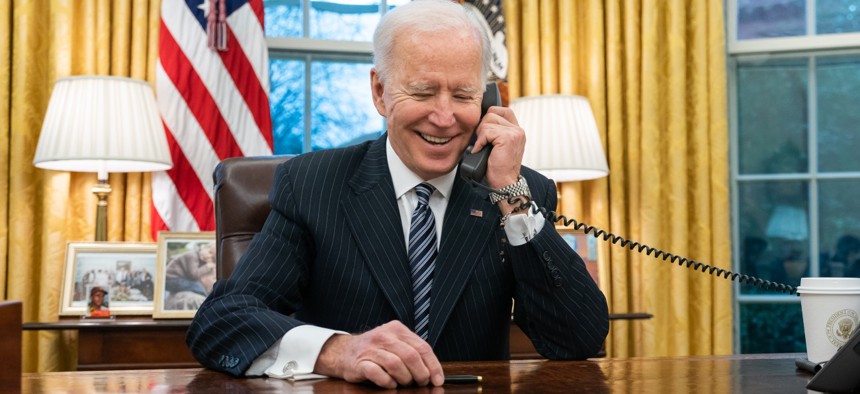
Official White House Photo by Adam Schultz
Biden Proposes 2.7% Raise for Feds in 2022, Restoring Pay Parity
Although it is unclear how plan breaks out between locality pay and across-the-board increases, the topline number matches the president's proposed pay raise for members of the military.
President Biden on Friday formally proposed an average 2.7% pay increase for federal civilian employees in 2022 as part of his fiscal 2022 budget proposal.
The figure marks a stark improvement over the 1.0% across-the-board increase feds received in 2021 after former President Trump pushed for a pay freeze in the final days of spending negotiations last year. But it falls short of a proposal by some Democratic lawmakers to provide feds with a 3.2% average pay raise next year, as well as the average 3.1% pay increase approved for 2020.
“The administration is committed to empowering, rebuilding and protecting the federal workforce, which is why the budget provides for a 2.7% percent pay increase for the federal civilian workforce,” the White House stated in budget documents.
It was unclear Friday how Biden’s proposal would be divvied up between an across-the-board boost to basic pay and increases in locality pay. In recent years, pay raise provisions have included a 0.5% average increase in locality pay, although it was frozen at 2020 levels this year. The Office of Management and Budget did not respond to a request for comment on the split between basic and locality pay.
The proposal also marks a return to the principle of pay parity between the civilian and military workforce, as service members would also receive a 2.7% pay raise in 2022. The Trump administration often proposed pay freezes on the civilian side, while consistently pushing for military pay raises.
In a statement, National Treasury Employees Union National President Tony Reardon described Biden’s pay raise proposal as a “solid start,” although he continues to support the 3.2% pay increase proposal.
“NTEU is working in Congress to pass the Federal Adjustment of Income Rates Act, which would provide federal employees a 3.2% average pay increase next year,” Reardon said. “This legislation has broad support and provides a 2.2% average across the board increase and a 1% adjustment to locality pay, which is essential for employees who live in high-cost areas of the country. We look forward to working with the administration and lawmakers to meaningfully recognize the contributions of the federal workforce, a bedrock of our democracy.”
Everett Kelley, national president of the American Federation of Government Employees, said that while the nation's largest federal employee union appreciates many of the federal workforce investments across Biden's budget proposal, a 2.7% pay raise is not sufficient to properly compensate workers.
“While we are supportive that the long tradition of military-civilian pay raise parity has been honored in the President’s proposal, 2.7% is simply not nearly enough to compensate for the losses in buying power of federal wages and salaries over the past decade,” Kelley said. “On average, federal workers are underpaid by 23% compared to those doing the same jobs in the private sector and state and local government. We ask Congress to support the modest 3.2% increase included in the FAIR Act.”







